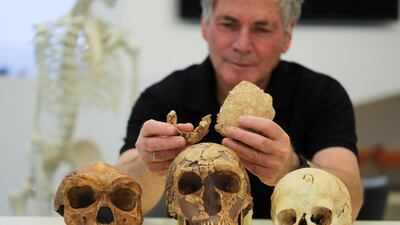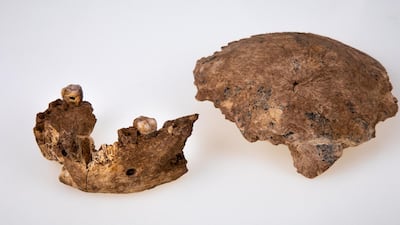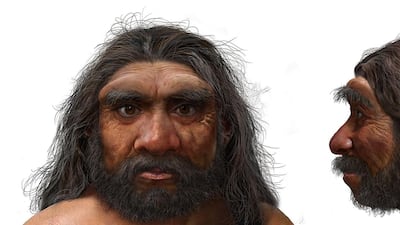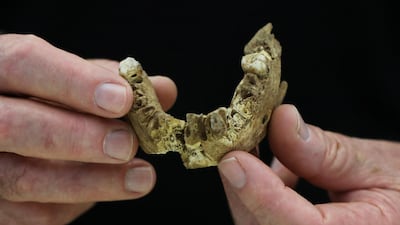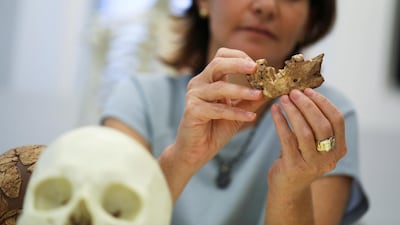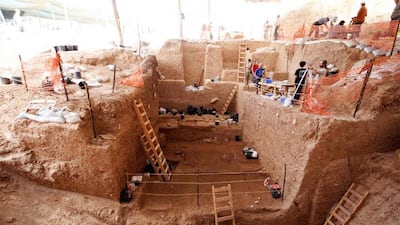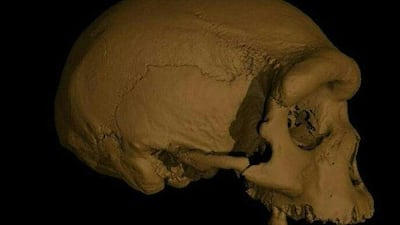Israeli scientists have discovered human remains distinct from Neanderthal humans, who walked the Earth until 40,000 years ago.
The previously unknown human ancestors have been called Nesher Ramla Homo type by the scientists, who uncovered the remains near the city of Ramla, south of Tel Aviv.
Fragments of a skull discovered at the site could be up to 140,000 years old.
The Nesher Ramla Homo group, the team believes, were thriving in the Middle East 400,000 years ago and probably related to the “pre-Neanderthal” inhabitants of Europe.
Neanderthals, or Homo sapiens neanderthalensis, likely became extinct over generations through breeding with their successors, early modern humans, but also faced harsh climatic conditions.
“This is the first time we could connect the dots between different specimens found in the Levant” said Tel Aviv University’s Dr Rachel Sarig.
"There are several human fossils from the caves of Qesem, Zuttiyeh and Tabun that date back to that time that we could not attribute to any specific known group of humans," she said.
"But comparing their shapes to those of the newly uncovered specimen from Nesher Ramla justify their inclusion within the [new human] group."
According to Dr Hila May, also of Tel Aviv University, the findings will change how we understand human evolution. The remains of the first identified Neanderthal were found in Neandertal valley, Germany, in 1856.
This led some scientists to believe that early humans originated in Europe or had been nomads who reached Germany from Asia.
That changed with the discovery of the remains an early species of human in Kenya in 1974.
The advent of DNA analysis in the 1980s was another leap forward in the study of early humans, again pointing to East Africa as the cradle of civilisation.
On Friday, a series of papers published in The Innovation, a scientific journal, announced the identification of another archaic human, Homo longi, based on a well-preserved skull first found in 1933 but only recently examined by scientists.
“Dragon Man” was named after the place where his skull was found in Harbin City, north-eastern China. It could be up to 300,000 years old.
Not just cavemen
“We had never imagined that alongside Homo sapiens, archaic Homo roamed the area so late in human history,” lead Nesher Ramla archaeologist Dr Yossi Zaidner said.
In line with the modern understanding of Neanderthals, the Nesher Ramla Homo were more advanced than the primitive caveman image popularised since the early 20th century.
“The archaeological finds associated with human fossils show that ‘Nesher Ramla Homo’ possessed advanced stone-tool production technologies and most likely interacted with the local Homo sapiens,” Dr Zaidner said.
COMPANY PROFILE
Name: Kumulus Water
Started: 2021
Founders: Iheb Triki and Mohamed Ali Abid
Based: Tunisia
Sector: Water technology
Number of staff: 22
Investment raised: $4 million
The Uefa Awards winners
Uefa Men's Player of the Year: Virgil van Dijk (Liverpool)
Uefa Women's Player of the Year: Lucy Bronze (Lyon)
Best players of the 2018/19 Uefa Champions League
Goalkeeper: Alisson (Liverpool)
Defender: Virgil van Dijk (Liverpool)
Midfielder: Frenkie de Jong (Ajax)
Forward: Lionel Messi (Barcelona)
Uefa President's Award: Eric Cantona
MATCH INFO
Manchester City 1 Chelsea 0
De Bruyne (70')
Man of the Match: Kevin de Bruyne (Manchester City)
PROFILE OF HALAN
Started: November 2017
Founders: Mounir Nakhla, Ahmed Mohsen and Mohamed Aboulnaga
Based: Cairo, Egypt
Sector: transport and logistics
Size: 150 employees
Investment: approximately $8 million
Investors include: Singapore’s Battery Road Digital Holdings, Egypt’s Algebra Ventures, Uber co-founder and former CTO Oscar Salazar
Key facilities
- Olympic-size swimming pool with a split bulkhead for multi-use configurations, including water polo and 50m/25m training lanes
- Premier League-standard football pitch
- 400m Olympic running track
- NBA-spec basketball court with auditorium
- 600-seat auditorium
- Spaces for historical and cultural exploration
- An elevated football field that doubles as a helipad
- Specialist robotics and science laboratories
- AR and VR-enabled learning centres
- Disruption Lab and Research Centre for developing entrepreneurial skills
Crops that could be introduced to the UAE
1: Quinoa
2. Bathua
3. Amaranth
4. Pearl and finger millet
5. Sorghum
START-UPS%20IN%20BATCH%204%20OF%20SANABIL%20500'S%20ACCELERATOR%20PROGRAMME
%3Cp%3E%3Cstrong%3ESaudi%20Arabia%3C%2Fstrong%3E%3C%2Fp%3E%0A%3Cp%3E%3Cstrong%3EJoy%3A%3C%2Fstrong%3E%20Delivers%20car%20services%20with%20affordable%20prices%3C%2Fp%3E%0A%3Cp%3E%3Cstrong%3EKaraz%3A%3C%2Fstrong%3E%20Helps%20diabetics%20with%20gamification%2C%20IoT%20and%20real-time%20data%3C%2Fp%3E%0A%3Cp%3E%3Cstrong%3EMedicarri%3A%3C%2Fstrong%3E%20Medical%20marketplace%20that%20connects%20clinics%20with%20suppliers%3C%2Fp%3E%0A%3Cp%3E%3Cstrong%3EMod5r%3C%2Fstrong%3E%3A%20Makes%20automated%20and%20recurring%20investments%20to%20grow%20wealth%3C%2Fp%3E%0A%3Cp%3E%3Cstrong%3EStuck%3A%3C%2Fstrong%3E%20Live%2C%20on-demand%20language%20support%20to%20boost%20writing%3C%2Fp%3E%0A%3Cp%3E%3Cstrong%3EWalzay%3A%3C%2Fstrong%3E%20Helps%20in%20recruitment%20while%20reducing%20hiring%20time%3C%2Fp%3E%0A%3Cp%3E%3Cstrong%3EUAE%3C%2Fstrong%3E%3C%2Fp%3E%0A%3Cp%3E%3Cstrong%3EEighty6%3A%20%3C%2Fstrong%3EMarketplace%20for%20restaurant%20and%20supplier%20procurements%3C%2Fp%3E%0A%3Cp%3E%3Cstrong%3EFarmUnboxed%3A%20%3C%2Fstrong%3EHelps%20digitise%20international%20food%20supply%20chain%3C%2Fp%3E%0A%3Cp%3E%3Cstrong%3ENutriCal%3A%3C%2Fstrong%3E%20Helps%20F%26amp%3BB%20businesses%20and%20governments%20with%20nutritional%20analysis%3C%2Fp%3E%0A%3Cp%3E%3Cstrong%3EWellxai%3A%3C%2Fstrong%3E%20Provides%20insurance%20that%20enables%20and%20rewards%20user%20habits%3C%2Fp%3E%0A%3Cp%3E%3Cstrong%3EEgypt%3C%2Fstrong%3E%3C%2Fp%3E%0A%3Cp%3E%3Cstrong%3EAmwal%3A%3C%2Fstrong%3E%20A%20Shariah-compliant%20crowd-lending%20platform%3C%2Fp%3E%0A%3Cp%3E%3Cstrong%3EDeben%3A%3C%2Fstrong%3E%20Helps%20CFOs%20manage%20cash%20efficiently%3C%2Fp%3E%0A%3Cp%3E%3Cstrong%3EEgab%3A%3C%2Fstrong%3E%20Connects%20media%20outlets%20to%20journalists%20in%20hard-to-reach%20areas%20for%20exclusives%3C%2Fp%3E%0A%3Cp%3E%3Cstrong%3ENeqabty%3A%3C%2Fstrong%3E%20Digitises%20financial%20and%20medical%20services%20of%20labour%20unions%3C%2Fp%3E%0A%3Cp%3E%3Cstrong%3EOman%3C%2Fstrong%3E%3C%2Fp%3E%0A%3Cp%3E%3Cstrong%3EMonak%3A%3C%2Fstrong%3E%20Provides%20financial%20inclusion%20and%20life%20services%20to%20migrants%3C%2Fp%3E%0A
South Africa World Cup squad
South Africa: Faf du Plessis (c), Hashim Amla, Quinton de Kock (w), JP Duminy, Imran Tahir, Aiden Markram, David Miller, Lungi Ngidi, Anrich Nortje, Andile Phehlukwayo, Dwaine Pretorius, Kagiso Rabada, Tabraiz Shamsi, Dale Steyn, Rassie van der Dussen.
RESULT
Bayern Munich 0 AC Milan 4
Milan: Kessie (14'), Cutrone (25', 43'), Calhanoglu (85')
Japan 30-10 Russia
Tries: Matsushima (3), Labuschange | Golosnitsky
Conversions: Tamura, Matsuda | Kushnarev
Penalties: Tamura (2) | Kushnarev
MORE ON THE US DEMOCRATIC PRIMARIES
Match info
Huddersfield Town 0
Chelsea 3
Kante (34'), Jorginho (45' pen), Pedro (80')
COMPANY%20PROFILE
%3Cp%3E%3Cstrong%3ECompany%20name%3A%3C%2Fstrong%3E%20Alaan%3Cbr%3E%3Cstrong%3EStarted%3A%3C%2Fstrong%3E%202021%3Cbr%3E%3Cstrong%3EBased%3A%3C%2Fstrong%3E%20Dubai%3Cbr%3E%3Cstrong%3EFounders%3A%3C%2Fstrong%3E%20Parthi%20Duraisamy%20and%20Karun%20Kurien%3Cbr%3E%3Cstrong%3ESector%3A%3C%2Fstrong%3E%20FinTech%3Cbr%3E%3Cstrong%3EInvestment%20stage%3A%3C%2Fstrong%3E%20%247%20million%20raised%20in%20total%20%E2%80%94%20%242.5%20million%20in%20a%20seed%20round%20and%20%244.5%20million%20in%20a%20pre-series%20A%20round%3Cbr%3E%3Cbr%3E%3C%2Fp%3E%0A
Kandahar%20
%3Cp%3E%3Cstrong%3EDirector%3A%3C%2Fstrong%3E%20Ric%20Roman%20Waugh%3C%2Fp%3E%0A%3Cp%3E%3Cstrong%3EStars%3A%C2%A0%3C%2Fstrong%3EGerard%20Butler%2C%20Navid%20Negahban%2C%20Ali%20Fazal%3C%2Fp%3E%0A%3Cp%3E%3Cstrong%3ERating%3A%3C%2Fstrong%3E%202.5%2F5%3C%2Fp%3E%0A
Price, base / as tested From Dh173,775 (base model)
Engine 2.0-litre 4cyl turbo, AWD
Power 249hp at 5,500rpm
Torque 365Nm at 1,300-4,500rpm
Gearbox Nine-speed auto
Fuel economy, combined 7.9L/100km
More on Quran memorisation:
The Sand Castle
Director: Matty Brown
Stars: Nadine Labaki, Ziad Bakri, Zain Al Rafeea, Riman Al Rafeea
Rating: 2.5/5
TCL INFO
Teams:
Punjabi Legends Owners: Inzamam-ul-Haq and Intizar-ul-Haq; Key player: Misbah-ul-Haq
Pakhtoons Owners: Habib Khan and Tajuddin Khan; Key player: Shahid Afridi
Maratha Arabians Owners: Sohail Khan, Ali Tumbi, Parvez Khan; Key player: Virender Sehwag
Bangla Tigers Owners: Shirajuddin Alam, Yasin Choudhary, Neelesh Bhatnager, Anis and Rizwan Sajan; Key player: TBC
Colombo Lions Owners: Sri Lanka Cricket; Key player: TBC
Kerala Kings Owners: Hussain Adam Ali and Shafi Ul Mulk; Key player: Eoin Morgan
Venue Sharjah Cricket Stadium
Format 10 overs per side, matches last for 90 minutes
Timeline October 25: Around 120 players to be entered into a draft, to be held in Dubai; December 21: Matches start; December 24: Finals
